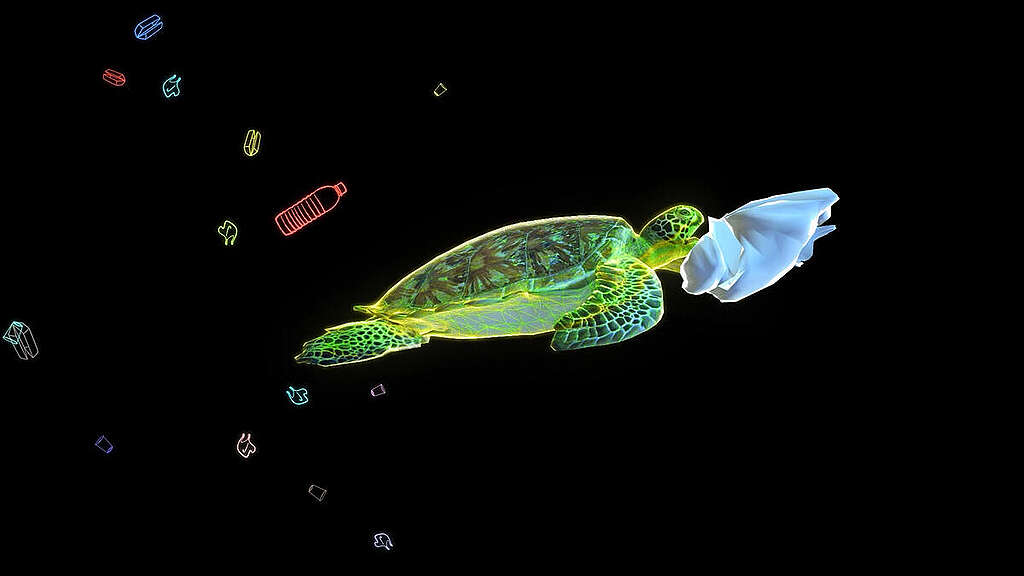Plastic pollution is everywhere – it has flooded our planet, harming people’s health, accelerating social injustice, destroying biodiversity and fueling the climate crisis at each stage of plastic’s lifecycle.
The Global Plastics Treaty is a once-in-a-generation opportunity to solve the plastics crisis. For the sake of our collective future, we cannot waste this moment.
The full lifecycle of plastic harms livelihoods and the climate. The fact is that 99% of plastic is made from fossil fuels; oil & gas — and Big Oil, in league with Big Brands, continue to make more, promote false solutions and a throwaway single-use model where corporate profits come before the health of our communities.
Greenpeace, with our allies and supporters, demand a treaty that will keep oil and gas in the ground and stop big brands and big oil from producing more and more plastic. A treaty that does not stop runaway plastic production & use is a failure.
The Global Plastics Treaty must:
- End plastic pollution – from production to disposal – to protect the environment and human health
Plastic pollution floods our planet, destroys biodiversity, and worsens the climate crisis across the entire life of plastic – from extraction, production, packaging, distribution, incineration and dumping. This deadly cycle brought by runaway plastic production and use needs to stop for good. - Set a legally-binding target to reduce plastic production by at least 75% by 2040 to stay below 1.5° C
Plastic production keeps us dependent on fossil fuels and not only drives climate change, but also biodiversity loss and harms communities and workers living near production sites and landfills. If the industry has its way, plastic production could double within the next 10-15* years, and triple by 2050. The treaty must cut plastic production by at least 75% by 2040 based on a 2019 baseline followed by a phasedown in the production and use of plastic and deliver a just transition away from all virgin production capacity. - End single-use plastics, starting with the worst offending items like plastic sachets
All plastics are problematic when considered from a whole life cycle approach — the environmental, health and social impacts from extraction (e.g fossil sources), plastic production, use, waste management and disposal make a strong case that plastic must be reduced as far as possible, particularly where safer, more sustainable, and circular substitutes exist. Due to the large-scale use of plastic in todayʼs society, it is imperative that we eliminate the most problematic plastic products first. - Ensure a just and inclusive transition to a low-carbon, zero-waste, reuse-based economy
The treaty must drive a just transition to sustainable livelihoods across the plastics supply chain, empower workers, prioritizing waste pickers and other affected communities. It must support reuse and refill business models; prioritize the interests of Indigenous Peoples and advance traditional knowledge. - Be firmly rooted in a human-rights based approach that reduces inequality, prioritizes human health, and centers justice in its creation and implementation.
From production to disposal, plastic pollution negatively impacts our health and human rights. It accelerates social injustice and environmental degradation, and aggravates inequalities brought about by the climate crisis. The negotiations must ensure fair and equitable representation throughout the negotiation and implementation process from Indigenous Peoples and communities disproportionately affected by the plastic pollution crisis. The treaty must have a strong foundation in justice and human rights in order to mitigate further harm.
Plastic pollution is one of the most pressing environmental challenges of our time, with the impacts growing more severe every day.
The plastics crisis touches every corner of the globe. It is in the deepest parts of our oceans and on the highest mountain peaks and even in our bodies. During the negotiations process, we will show how an unstoppable global movement can achieve an ambitious Global Plastics Treaty that will turn off the plastics tap and finally, end the age of plastic – for our health, our communities, climate, and the planet.

Let’s end the age of plastic – sign the petition for a strong Global Plastics Treaty